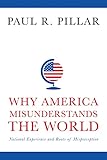Why America Misunderstands the World : National Experience and Roots of Misperception / Paul Pillar.
Material type: TextPublisher: New York, NY : Columbia University Press, [2016]Copyright date: ©2016Description: 1 online resource (224 p.)Content type:
TextPublisher: New York, NY : Columbia University Press, [2016]Copyright date: ©2016Description: 1 online resource (224 p.)Content type: - 9780231165914
- 9780231540353
- 327.73
- JZ1480 .P55 2016
- JZ1480
- online - DeGruyter
- Issued also in print.
| Item type | Current library | Call number | URL | Status | Notes | Barcode | |
|---|---|---|---|---|---|---|---|
 eBook
eBook
|
Biblioteca "Angelicum" Pont. Univ. S.Tommaso d'Aquino Nuvola online | online - DeGruyter (Browse shelf(Opens below)) | Online access | Not for loan (Accesso limitato) | Accesso per gli utenti autorizzati / Access for authorized users | (dgr)9780231540353 |
Browsing Biblioteca "Angelicum" Pont. Univ. S.Tommaso d'Aquino shelves, Shelving location: Nuvola online Close shelf browser (Hides shelf browser)

|

|

|

|

|

|

|
||
| online - DeGruyter The Lost Garden : A Novel / | online - DeGruyter An Annotated Bibliography for Taiwan Film Studies / | online - DeGruyter Sprezzatura : Concealing the Effort of Art from Aristotle to Duchamp / | online - DeGruyter Why America Misunderstands the World : National Experience and Roots of Misperception / | online - DeGruyter Green Capital : A New Perspective on Growth / | online - DeGruyter Relativism and Religion : Why Democratic Societies Do Not Need Moral Absolutes / | online - DeGruyter A Political Economy of the Senses : Neoliberalism, Reification, Critique / |
Frontmatter -- Contents -- Preface -- 1. The American Prism -- 2. Behind The Ocean Moats -- 3. Abundance and Power -- 4. The Successful Society -- 5. Searching for Monsters to Destroy -- 6. Unending Misperception -- Notes -- Index
restricted access online access with authorization star
http://purl.org/coar/access_right/c_16ec
Being insulated by two immense oceans makes it hard for Americans to appreciate the concerns of more exposed countries. American democracy's rapid rise also fools many into thinking the same liberal system can flourish anywhere, and having populated a vast continent with relative ease impedes Americans' understanding of conflicts between different peoples over other lands. Paul R. Pillar ties the American public's misconceptions about foreign threats and behaviors to the nation's history and geography, arguing that American success in international relations is achieved often in spite of, rather than because of, the public's worldview. Drawing a fascinating line from colonial events to America's handling of modern international terrorism, Pillar shows how presumption and misperception turned Finlandization into a dirty word in American policy circles, bolstered the "for us or against us" attitude that characterized the policies of the George W. Bush administration, and continue to obscure the reasons behind Iraq's close relationship with Iran. Fundamental misunderstandings have created a cycle in which threats are underestimated before an attack occurs and then are overestimated after they happen. By exposing this longstanding tradition of misperception, Pillar hopes the United States can develop policies that better address international realities rather than biased beliefs.
Issued also in print.
Mode of access: Internet via World Wide Web.
In English.
Description based on online resource; title from PDF title page (publisher's Web site, viewed 02. Mrz 2022)


